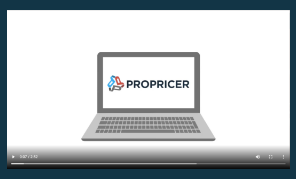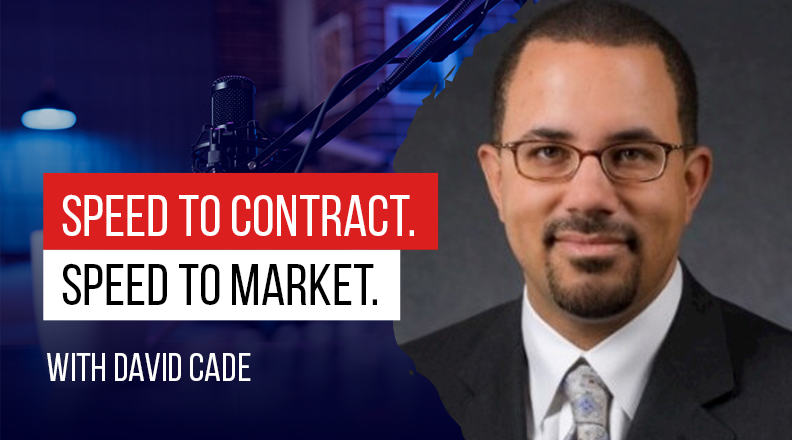In these captivating excerpts from one of our latest Speed to Contract, Speed to Market podcast episodes, host Tim Templeton talks with Elliott Branch, former Deputy Assistant Secretary of the Navy for Acquisition and Procurement. Subjects on deck? How we can rethink contracting competition to integrate efficient tradeoffs, how value analysis can become integral to the acquisition process, and how both agencies and industry can modularize IP systems for the good of all.
Below are excerpts from the interview, edited for brevity and clarity.
We know that contract competition effectively increases quality and responsiveness—by industry—and reduces costs or makes costs as efficient as possible. But I still think we have to take another look at competition.
The other thing that we need to look at is why we have the government contracting structure in place that we do. And we've got to look at the reasons behind the process before we start tinkering with the process.
So, those are the two places that we need to visit.
Rethink contract competition to integrate trade-offs
We—the Department of Defense (DoD)—get money from The Hill in a very program-centric way, making it very hard for the Department to make trade-offs, just as you might make a trade-off when you go into the grocery store or Home Depot. I think about those things all the time.
For example, I have a rule in my house: When I'm buying wine to cook with, I'm not willing to cook with anything I'm not willing to drink because I just don't find that it works as well. So that's a best-value trade-off, right? I can either buy the high-end wine or look for a substitute, an ingredient that adds the same flavor, whether I’m tasting it in a recipe or tasting it as I drink it.
I can make those trade-offs in my personal life. We don't get to make those trade-offs in the Department. If we get money to buy joint strike fighters or the latest F-16 variant, we have to purchase joint strike fighters or the latest F-16 variant. But not both.
We don't get to sit down and say, depending on what industry wants for those on a per-unit basis, what would be the mix we might have, just as we might consider when we go into the grocery store? Where we might buy a little less wine and a little more vermouth for cooking purposes?
Another excellent example is we've got several kinds of tablets on the market. You can get an iPad, you can get an Android tablet, or you can get a Chromebook. They're not exactly the same, but if we could make tradeoffs in purchasing a mix of tools such as these, we could put ourselves in a position where we don't have to rely on the system to produce data that substantiates one over the other.
The system should efficiently correct for information asymmetry
My second thought is that the system is in place for a reason. If you look at the Truth in Negotiations Act, which drives much of this, it's there to correct for an information asymmetry. And I just look at that very simply in baseball terms. If I could figure out what makes Juan Soto the prodigious hitter he is—that we at Washington foolishly traded away to you all in San Diego—then what would I do?
I would simply document that. And then I would go to class AA baseball, take an average middling hitter, give him a hitting coach, and give them both the Juan Soto book on how to become a great hitter. And I would train great hitters, but I can't do that for obvious reasons.
So, industry has a secret sauce. I understand they need to protect it; that's intellectual property. It is not just designs, but it's also their business process. I also know that we have to guard against industry being able to exploit those things to the detriment of the taxpayer. So we put things like certified cost and pricing data in place to correct the industry's information asymmetry over us.
And I'm concerned that we keep chipping away at these things in the interest of “streamlining” because we'll eventually wind up with a very mild and ineffective way to correct that information asymmetry. I would argue that we must determine how to get at the assumptions behind the process.
Value analysis can become part of the contracting business
We've discussed value analysis, though we've never defined it. I think we have to work on value analysis because there are some things—we see this in the Russian and Ukrainian conflict— that we would pay a significant amount for, regardless of what it costs to acquire a capability. As things started in the conflict there, I'm pretty sure the Ukrainians didn't sit down and ask the Turks about their indirect and DNA rates.
Instead, they say, “We've got an existential threat on our hands. We don't own the skies. Do you have technology that can help us redress that balance? And we're willing to pay, from a public policy perspective, what we think that's worth.”
So, I think we can move more to value analysis in some of our contracting areas.
Modularize IP analysis for the good of both industry & agencies
We can protect the intellectual capital that Primes have invested in their systems. We can modularize their technology. So we’re providing a standard output in an industry-standard way. We have an example of that in our submarine force from years ago when the Soviet Union fell.
There was a sense that we did not need to continue to grow the capability of our submarine combat systems.
This was in the early to mid-90s. And the people who were in that space vehemently disagreed. But the people who control the money said, “We have other priorities for the money.” So, what they did was they essentially had a conversation with the leaders in that particular market segment, and they said, “We need you to do some different things. We're going to modularize the product we buy from you; we're going to put in middleware and ensure that we get standard outputs in a particular form. And we need you to help us identify those breakthrough and emerging technologies that can plug into those standards so that we can spread that work.”
What did it amount to? It made room for Primes, albeit in a different role, and emerging technologies from the sector. Because they stopped using purpose-built computers, which combat systems had used for years, and they started using standard off-the-shelf computer equipment—the same Intel solution we're using to have this conversation today, or close. So I think there are some things that we can do, but I'm not sure that simply, if you will, taking the current process and trying to modify it is the right way to go.
Make path-dependent decisions about government tech
One of the things that we need to think about when we think about resistance to change is that every decision we make in a highly technological space is what eCommerce will call a path-dependent decision.
So, this idea of purpose-built computers: I've created an industrial base for them. I've created a supply chain, and there's revenue flying into that supply chain. I've created engineers that have a facility for that. I've created plant equipment that knows how to do that in a very optimal way. And then somebody walks in and says, “Hey guys, we can use the same chips that go into your PC.”
If we were clever with our software, we could do the same thing. And that leads to a problem called “stranded assets.” Because I've built all this capital up and I've decided to educate people in a certain way, construct facilities in a certain way, configure the supply chain in a certain way—then people are going to say, “Wait a minute, what now happens to my investment?”
The larger question is, “If you don't change, given that the world will change around you, what happens to your investment?” I think we reached equilibrium, where industry and the Navy decided that the consequence of not changing was a much greater, much more adverse consequence than abandoning the way it did business.
I think that's human nature, and we've got to spend some time talking, not necessarily at the high level, but at the grassroots level, about, “Ok, so what happens if we don't change?”
Having that conversation gives industry and the Navy an opportunity to reflect on the implications of change. It allows some folks to make decisions. And they aren’t immediate decisions. Think about the decisions that can result in a dramatic change in circumstance—what you might call a “swift transition.”
If you go back to the credit crisis of 2008, certain companies ceased to exist—like Lehman Brothers. But I would argue, as tragic as that was, that it stemmed from perhaps an unwillingness in that particular market to sit down and ask, “How is this market changing? What are we doing to ensure that the fundamental underpinnings of the way we do business are sound?”
And because people didn't want to make those kinds of decisions, people didn't want to reflect on that. What happened was they were making their numbers until they weren't. And when they weren't, they weren't very quickly. And it was a drastic outcome. We don't want to get into that position with our national defense.
Never confuse the facts with the truth
Framing is critical. My son and I have had this conversation about history books. He has said, “Dad, do you believe what's in that history book?” And my answer to him was, “You know, never confuse the facts with the truth. And I think that while we may have the same facts, the truth is a matter of framing.”
Just as an example: If you are ill, you go see your internal medicine specialist, and she says, “You know, you're ill, but no worries. We have a procedure, there's a medical procedure, and we can address your problem. But I have to be honest with you. There's a 10% chance that you might not survive that procedure.”
Well, you think, “Ten percent? That's horrible.” So, her colleague, from whom you solicit a second opinion, says, “Well, I looked at Dr. Smith's case file, and I've looked at your X-rays, and I have excellent news for you. We have a procedure to address that problem, and there's a 90% chance you'll survive.”
So, the facts are the same, nine out of 10 times in both those cases, you will survive, whatever this procedure is. But you look at it differently because we have framed it in a certain way, through the second opinion. Framing is essential in how we consider potential future realities.
Revisit past panels & implement their innovations
A few years ago, we had a congressionally mandated panel, Section 809, which looked at streamlining the acquisition system. The first thing we do is go back and revisit the work that the panel did.
We did implement some of it, but frankly, this is the nature of our politics: The folks that were keenly interested in doing that work, Senator McCain and his staff, weren't there when the panel finished their work. And the folks that were had different priorities at the time. There are things still on the table from that work.
Going back to the Packard Commission, there are also likely things on the table. If we just did a literature review and said, “You know, some of these ideas have been around for a while, which ones are the ones we ought to focus on?” I'm not sure we need to start a panel all over again, though we’ve done that several times. It may be a good idea to go back and look at some things we've not implemented.
I'll give you an analogy. I won't say I'm a golfer, but I own a set of clubs and like to tinker with the game.
And there are many of what I call science experiments in my game. So there are clubs not in my bag that might be useful at one point in my game. And occasionally, I'll go revisit that second bag and say, “This is what's going on with my swing, or these are the courses I'm playing. Are there clubs in that bag I can now pull out that'll be more effective than those in my bag?” So, for example, it's turning to fall here in Northern Virginia. You've got a lot of leaves; you got a lot of gnarly rock. So my five wood is back in the science experiment bag. And my three hybrid is in my playing bag because I just looked at it and said, “Hey, circumstances have changed on my home course. I need a different set of tools.“
We've done studies over the last 50 years or more on all of the tools we might bring to bear. Why don't we go back into the science experiment bag and see if some of those tools are useful? We can do that in the short term.
The other thing we can do is start to have a conversation. And I think we need to have it at a national security level—about aligning the business process with the national security environment needs and our needs. I don't think we've ever done that, so I look at it this way: If you are moving toward more off-the-shelf technology, if you're moving into a more multipolar world, if you're moving into a world where people like the Chinese perhaps have secured favor or more privileged access to things like rare earth metals and other things, what do you need to do to stay secure?
Should competition be reimagined—or desired but not preferred?
What do you need to focus on to maintain a national security advantage? And how must the business system then support that? I'll throw a very controversial idea out there. We may be at a place where competition, as we understand it, should be revised or reimagined. And maybe we're at a place where competition should be desired but not preferred. You know, had we been in that kind of a situation—and I know this is heresy to my contracting friends—we might have been able to tap the commercial marketplace more easily, right?
Speed to contract. Speed to market. Book your demo.
Contracting firms: Struggling with complex proposals? ProPricer's advanced software streamlines pricing challenges, speeding you to both contract and market. Boost efficiency now. Schedule your demo today >
Save the Date: Government Contract Pricing Summit
June 11 - 13, 2024
Discover the latest trends in government contracting and learn from industry leaders at the upcoming Government Contract Pricing Summit. Whether you attend in person or virtually, you’ll gain a wealth of contract pricing information.
See fascinating keynote sessions and live-panel discussions on Speed to Contract, Speed to Market, and many more fascinating topics, featuring subject matter experts from government agencies and industry alike. Learn more >
Sources
Speed to Contract. Speed to Market: Video Podcast featuring Elliott Branch





